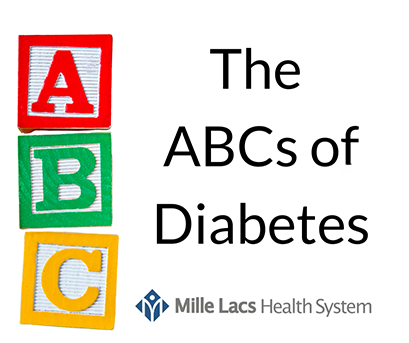The ABCs of Diabetes
November 29, 2024
November is National Diabetes Month, a time dedicated to raising awareness about diabetes and empowering individuals to take control of their health. Diabetes affects nearly 38 million Americans, impacting their blood sugar levels and putting them at risk for complications such as heart disease, kidney damage, and vision problems. Managing diabetes effectively can be challenging, but the “ABCs of Diabetes” provide a helpful guide to monitor key health factors and prevent complications.
A is for A1C
The A1C test measures average blood glucose levels over the past two to three months. Maintaining a target A1C level can help reduce the risk of complications. The A1C goal may vary depending on individual health, but for many adults, a target below 7% is common. Regular A1C testing allows individuals and healthcare providers to track long-term blood sugar control and make adjustments as needed. Keeping A1C levels in check is essential to minimizing damage to blood vessels and reducing the risk of serious health issues.
B is for Blood Pressure
High blood pressure, or hypertension, is a common problem for people with diabetes and increases the risk of heart attack, stroke, and kidney disease. Managing blood pressure is critical to overall health, and many people with diabetes aim for a blood pressure reading below 140/90 mmHg, though individual targets may differ. Lifestyle changes such as regular exercise, reducing salt intake, and managing stress can help maintain healthy blood pressure. Regular monitoring at home or with a healthcare provider ensures that any changes are detected early and addressed.
C is for Cholesterol
Cholesterol levels are another essential factor in managing diabetes health. High levels of LDL (“bad” cholesterol) and low levels of HDL (“good” cholesterol) can lead to plaque buildup in arteries, increasing the risk of heart disease. Aiming for healthy cholesterol levels can be achieved through diet, exercise, and sometimes medication. Eating more fiber, limiting saturated fats, and staying active are effective ways to maintain good cholesterol levels and support cardiovascular health.
Knowing and managing your ABCs can empower you to take control of your health and prevent diabetes-related complications. Taking small steps toward a healthier lifestyle can make a big difference, such as incorporating balanced meals, engaging in physical activity, and monitoring blood sugar regularly. Regular check-ups with healthcare providers are also key in setting and maintaining personalized goals for A1C, blood pressure, and cholesterol.
Mille Lacs Health System offers monthly Diabetes Support Groups open to patients, community members, and the family of diabetics. You can also meet with our Diabetes Educator, Jayme Westling, PharmD to help manage your diabetes.
